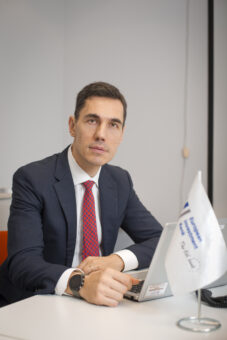
Less developed countries are torn between the struggle to preserve energy stability and the domestic economy on the one hand and the pressures imposed by the global energy transition on the other. The main reason for their inability to keep pace with the rest of the world is the lack of financial resources, so achieving carbon neutrality in underdeveloped countries largely depends on advisory, moral and financial support.
The European Investment Bank (EIB) actively finances projects that contribute to climate change mitigation worldwide and thus represents one of the pillars of global green transformation. We talked about the EIB’s strategy and mission and their activities in the Western Balkans and our country with Alessandro Bragonzi, Head of the EIB Regional Office for the Western Balkans.
EP: The European Investment Bank is one of the main financiers of projects contributing to the fight against climate change. What kind of projects are we talking about, and in which countries are you implementing projects?
Alessandro Bragonzi: Under our Climate Bank Roadmap 2021-2025 adopted in 2020, the EIB has made a commitment to directing 50 percent of its lending to climate action and environmental sustainability by 2025. This goal was already achieved last year when we allocated EUR 27.6 billion to climate action globally, which represents 51 percent of our financing volume.
We have aligned all our activities with the Paris Agreement goals, confirming our role as a leader in climate financing. We plan to help mobilize EUR 1 trillion in climate and environmental sustainability projects over the current decade. On the mitigation side, for example, there is a need for energy efficiency investments to reduce energy poverty in Europe or support for low-carbon public transport designed with the travel needs of different socio-economic groups, women and men in mind. Targeted investments in renewable energy – both on and off-grid – can support the 1.1 billion people that today lack access to electricity while tackling related gender inequalities.
Let me mention a few of the concrete climate projects the EIB is supporting across the globe. Together with the World Bank, we are implementing the City Climate Finance Gap Fund, which helps cities plan projects that cut emissions and improve daily life in urban areas. Also, Western Balkans’ cities benefit from this valuable technical assistance. In Uganda, the EIB is financing the distribution of 240 000 solar power systems for homes. Thanks to this investment, over a million people across the country will get electricity for the first time to power mobile phones, provide light and make cooking easier. A EUR 280 million EIB loan is enabling ArcelorMittal to develop steel production methods that reduce emissions and help the environment in several EU countries. We support forest renewal in Latin America through the Land Degradation Neutrality Fund, which manages 500 000 hectares of land sustainably. The EIB is financing Europe’s first floating wind farm off the coast of Portugal, towering 210 metres above the North Atlantic. An impressive feat of engineering, the three turbines generate enough electricity for 60 000 households, saving an estimated 1.1 million tonnes of CO2 a year. Details of the Bank’s activities in the sector and highlights of key projects are publicly available. The most recent example is the Climate Action and Environmental Sustainability Overview 2022, published in March.
In focus:
EP: The goal of the European Investment Bank is to make Europe a carbon-neutral continent by 2050. Is the same goal achievable for the Western Balkans countries since fossil fuels will have priority over renewable energy sources for a long time to come?
Alessandro Bragonzi: Under the European Green Deal, greenhouse gas emissions will need to be reduced by 55 percent by 2030. Carbon pricing, a cornerstone of Europe’s energy transition, will continue to play a key role, including through the extension of the EU ETS emissions trading scheme to new sectors. Inevitably, these developments will affect the EU acquis, a precondition for Candidate Countries in the Western Balkans to move forward with their EU accession process.

However, several countries in the Western Balkans still heavily rely on coal/lignite for power production, despite deteriorating air quality, adverse health effects and significant untapped potential for renewable energy. Serbia, for instance, has made significant progress, particularly in the renewable energy and energy efficiency sectors, thanks to the adoption of new laws. The country has implemented a market-based support scheme via the newly adopted Law on the Use of Renewable Energy Sources. However, we are still waiting to adopt Serbia’s National Energy and Climate Plan, which clearly spells out its decarbonization commitments and pathway. The Western Balkans, in part of EIB goals to make a Just Transition. It needs our strong support to gradually move away from coal and increase the share of energy from renewables.
EP: How much has the EIB allocated so far for the Western Balkans, and which projects are key to decarbonizing this part of Europe? Alessandro Bragonzi: Since 2009, the EIB has invested close to EUR 9.5 billion in the Western Balkans. Our goal is to support sustainable economic development and the EU integration process by improving living and business conditions for people across the region in terms of transport, water accessibility, energy supply, education, and healthcare quality. Regarding climate goals, we are supporting the public and private sectors. For example, we launched a dedicated credit line in 2021 to encourage SMEs to adopt climate and energy-efficient projects and practices, enabling a faster transition to a sustainable and circular economy.
In Serbia, together with the EU Delegation, UNDP, Sweden, and the Serbian government, we are helping Serbian companies, and local self-governments implement environmentally friendly projects to reduce the carbon footprint and pollutant emissions, waste and air pollution and help protect biodiversity and the ecosystem.
In Bosnia and Herzegovina, we are providing technical support for preparing the Vlašić renewable energy project, which will facilitate the construction of a 50 MW wind farm in the Travnik region. Thanks to these efforts, the country can boost its energy supply, increase power generation from renewable resources and reduce dependence on fossil fuels, thus stimulating sustainable growth. At the same time, we are investing in large-scale projects that help reduce CO2 emissions, such as modernization of railways, improvement of inland waterways along the Sava and Danube rivers and the upgrade of urban transport in Sarajevo and Niš. These investments will enable a gradual shift in passenger behavior from private to public and more climate-friendly modes of transportation.
Interviewed by: Milena Maglovski
Read the story in the new issue of the Energy portal Magazine RENEWABLE ENERGY SOURCES.



